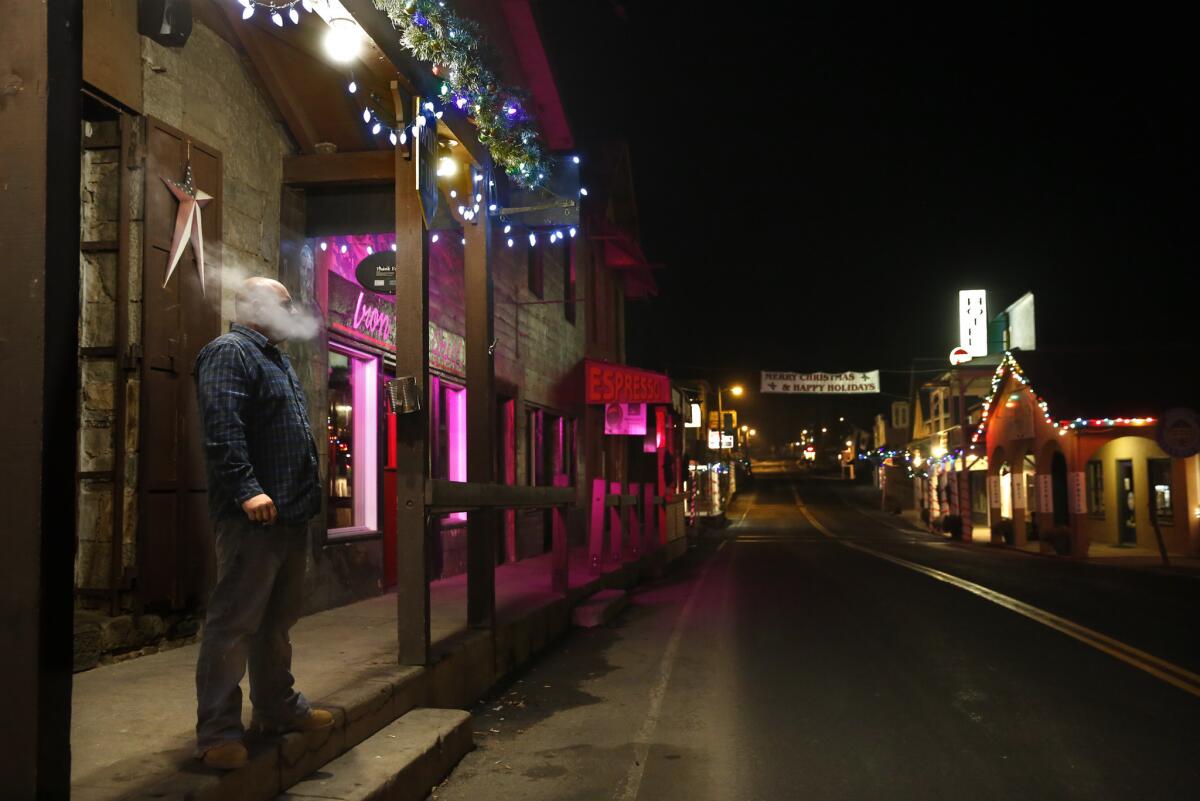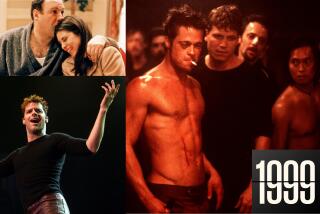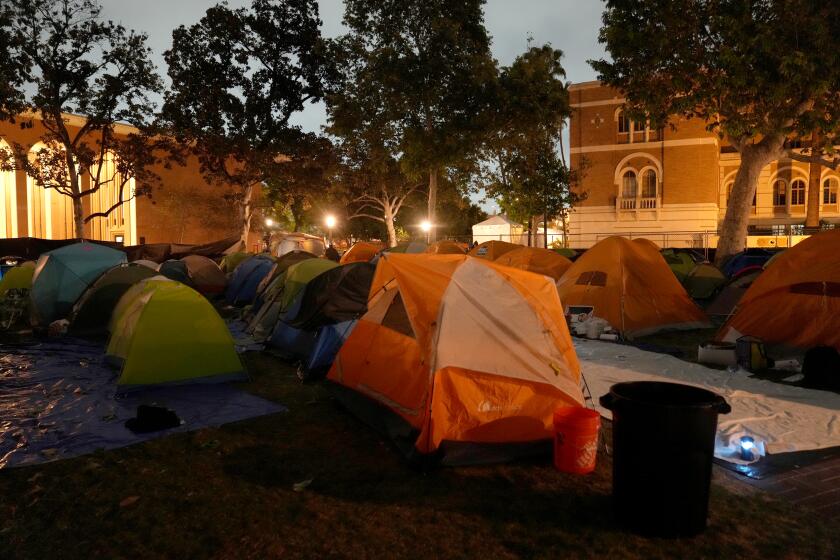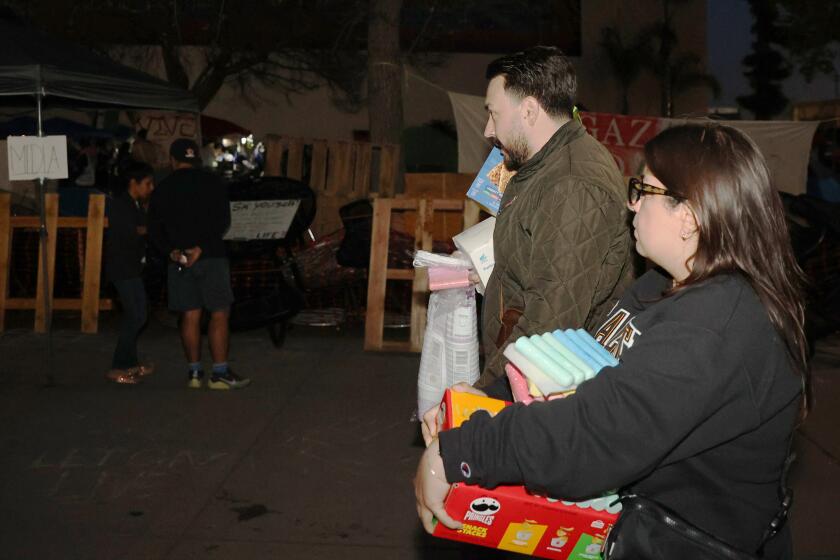Setting Times stories to music: From Ryan Adams to Aztec Camera

What does it mean for the coming year when New Year’s Eve starts out strangely?
First, I walked up the middle of Broadway in downtown Los Angeles. At rush hour.
They had closed off the road for the Grand Park party, and everyone else seemed to be sticking to the sidewalks – out of habit, I suppose. But I wasn’t going to lose my chance to own the street itself.
Then, at my empty bus stop, a man walked up making a lot of noise. The sound was out of context, so it took a bit to realize that he was crying, and not just the odd-tear-wiped-away kind. He was sobbing, even occasionally moaning. When I asked him if he was OK, he nodded yes, but it was difficult to believe him. I might remember that face – and that sound -- forever.
It makes me think of the Yeats poem “The Stolen Child”:
Come away, O human child!
To the waters and the wild
With a faery, hand in hand,
For the world’s more full of weeping than you can understand.
The poem even has its own soundtrack: One of my favorite bands, the Waterboys, did a musical version that’s lovely.
And because it’s a new year, I have to add this: The world’s also more full of joy than we can understand.
Anyway, in these roundups of the week gone by, I’d like to offer the first paragraphs of each Great Read (or, as they’re known in print, Column One) -- maybe they’ll buy your eye and you can settle in for a good weekend read. And you’ll also get the songs that inspired me while editing the stories, or reading them later if my fellow editor Millie Quan ushered them through. A story-song combo!
#
One troubled priest who got a second chance
He was given a second chance here, in the High Plains of Texas, where a patchwork of cotton and wheat fields unfurls beneath a giant blue sky.
He was no longer Father John Salazar, a name typed across yellowed newspapers and courthouse microfilm more than a thousand miles away in Los Angeles. He was Father John Salazar-Jimenez, the face of Catholicism in this town of emptied grain elevators and darkened shop windows.
Yolanda Villegas adored Father John. A pillar of the Church of the Holy Spirit, she knew nothing of his past. Few parishioners did. Nearly every Sunday for a decade, she arrived for the Spanish-language Mass, knelt in the same pew and wondered how he’d inspire her that week.
“When he lifted the chalice and lifted the host, it almost felt like Jesus was doing it,” Villegas said.
They grew close as Villegas grieved for her daughter who had been killed in a car accident not long before the priest’s arrival in 1991. He later helped her teenage grandson Beau practice Spanish.
One day, in the spring of 2002, he asked Villegas to gather her family. He had something to confess.
#storysongs combo: “Rip Tide,” by Beirut. “This is the house where I could be unknown.” A song filled with equal parts dread and acceptance of being pulled under by the rip tide.
#
At 95, this pianist is still playing Las Vegas’ tune
The old man crouches over a Steinway in the hotel lobby, a lifetime of musical mementos stacked above the keyboard — photographs, news clippings, old albums and CDs for sale.
Joe Vento is a gray-haired showman, a gregarious self-promoter who’s proud of a body of work that spans decades. He smiles widest when he reveals his age — telling audiences he just turned 95.
Each weekend, he plays in the 1960s-themed lobby of the off-Strip Royal Resort, greeting the harried travelers in a hurry to reach the front desk just beyond. It’s a tough gig, and he hustles to peddle the nostalgia of his old-school jazz, calling out to newcomers for a request, any request. Vento is rarely stumped.
He sits propped on two pillows, working the room from the piano. When a visitor says he’s from Toronto, Vento launches into the Canadian national anthem, singing the lyrics from memory. He spies a French couple he’s seen before and rolls into a can-can.
A listener mentions he’s just turned 60 and Vento plays a brief “Happy Birthday” before easing into a jazzy rendition of “For He’s a Jolly Good Fellow.”
All the while, he hails one passerby, then another, his hands racing across the keyboard as he talks. For this piano man, six listeners isn’t an embarrassment; it’s a packed house.
Dollars fall into his glass jar. On a good evening, he can make $500. But tonight, there’s a problem. “I forgot my teeth,” he whispers. “You get to be my age, everything hurts.”
#storysongs combo: “Piano Man,” by Billy Joel. I hasten to point out that just because this song is perfect for the story, it doesn’t mean I like Billy Joel.
#
A Mexican Coachella gives new meaning to ‘roots rock’
Valeriano Gomez was standing on a festival stage cradling his black guitar as fans spread out before him, waiting for the count-off, the downstroke, the next electric blast.
Gomez and his group wore matching woolen ponchos, dyed jet black, that made them look like some far-out garage band from the late LBJ era, the flavor of a long-gone week at the Whisky a Go Go.
But the scene took on a different tone when Gomez, 28, began to sing:
Mi xa na’, bu likemtal la tsunubale
Albun mi x-vul ta ajol …
Gomez’s group, Yibel Jme’tik Banamil, was among the featured performers at Mexico’s polyglot version of Coachella, a festival of rock not en español. The language was Tzotzil, a tongue spoken by Gomez and about 300,000 other indigenous Maya in the central highlands of Chiapas, one of Mexico’s poorest states.
“Do you remember?” the song went. “Where your roots are from?... Tell me if you still know the language of your ancestors.”
Gomez’s poncho wasn’t some groovy fashion throwback, but a chuj, the traditional daily costume worn by the men in his Maya hometown, San Juan Chamula. It is a place where the church floor is strewn with pine needles, chickens are sacrificed in religious ritual, and medicine men deliver remedies that predate the arrival of the Spanish.
But television had arrived by the time Gomez was growing up, and it was there that he heard the ‘80s band Survivor pound out its thumping hit “Eye of the Tiger” in the movie “Rocky III,” and there that he heard Los Lobos cover “La Bamba” as Lou Diamond Phillips played Ritchie Valens in the 1987 biopic. Thus began an unorthodox rock ‘n’ roll conversion.
“I identified a lot with Ritchie Valens,” Gomez said. “He was like us — young people trying to realize a dream. In our case, it’s a cultural dream, a dream of dignifying the original pueblos of Mexico.”
#storysongs combo: “Quiet Little Voices,” by We Were Promised Jetpacks. The band with the best name in recent memory, and a song just about as brilliant. Turn up the volume.
#
Women are taking their place on the ski jump
The start house isn’t much of a house, more like a concrete box perched high on the mountain.
Five women arrive on this frosty morning, setting their skis down outside and pushing through the door, rubbing their hands in the cold. They take turns leaning close to a heater, asking: “Is this thing working?”
Their complaints soon give way to chatter, as if the room might be warmed by voices echoing off bare walls, by talk of grocery shopping and friends and the contents of a thermos someone brought.
“Is it really hot cider?”
The start house has been their second home since they were girls, a place where these misfits could feel accepted. Even now, as adults, they consider it a haven.
Lindsey Van, the oldest one, explains: “There’s no way you could do this by yourself.”
They tug at the laces on their stiff leather boots and tighten the straps on their helmets. Just outside, a few paces away, waits an Olympic-sized ski jump.
Women were traditionally discouraged from clicking on skis and flying off the end of a steep ramp. Sports officials considered it too dangerous for them.
The women who train in Park City — members of the U.S. national team — have spent a decade fighting that notion. Next month, they will join competitors from around the world as female jumpers make their Olympic debut at the 2014 Sochi Games.
“People call you a pioneer or a barrier breaker,” Van says. “But that’s not what you’re thinking about when you’re doing it.”
#storysongs combo: “Jump,” by Aztec Camera. You know the Van Halen version, all David Lee Roth bluster. Well, singer Roddy Frame is the anti-David Lee Roth, and so is this song. Suddenly it becomes a study in vulnerability.
#
Devastated town rising from ashes of Rim fire
It’s hard to evacuate a peacock.
As the Rim fire closed in on the Spinning Wheel guest ranch last summer, Dharma Barsotti had to leave Elan behind, and figured he’d never see him again. But when he returned, the bird was sitting on the porch of one of the houses that still stood, a vivid splash of color against the blackened landscape.
On New Year’s Eve, on his way to dinner with his siblings, Barsotti picked one of Elan’s feathers off the ground and stuck it in his porkpie hat.
It had been one of those years when you hang on to the bright spots.
The Rim fire, California’s third-largest on record, raged for two months. It burned 257,314 acres of the Sierra Nevada range, including 10% of Yosemite National Park, the draw that brings people through Groveland on California 120. Two weeks after the smoke cleared, the federal government shut down, closing Yosemite for weeks during a balmy, blue-skied autumn.
Then, two weeks after the shutdown ended, the snows came and closed the Sierra passes for the season. In the isolated quiet there were transformations, large and small.
The most dedicated karaoke singer in town took to drinking too much, then stopped drinking or going out at all. A recent widow studied up on wildflowers after a fire. California Department of Transportation worker Rick Martinez — a former member of the “Over 300, Big Boys Club,” as he puts it — shed 47 pounds. He’d put in 14-hour days during the fire but was plagued by thoughts of whether he could have done more if he hadn’t been so exhausted.
At the Iron Door Saloon, Dharma’s sister Corinna cut staff and took over all the cooking shifts. Her husband, Chris Loh, worked the bar.
They may have to sell the Iron Door.
Running the saloon, which has been serving drinks since 1896, was thrust into Corinna’s hands when her mother died 10 years ago. Corinna was 25 and had different dreams.
Lately she’s been feeling a mix of weepy and exhilarated.
“Our houses burned. The bar’s going,” she said. “And inside me, I feel this deep sense of change.”
#storysongs combo: “Ashes & Fire,” by Ryan Adams. A song to make the heart keen. Here’s a lovely live version on the Jools Holland show.
#
If you have ideas for story-song pairings of your own, tweet the title and artist to @karihow or @LATgreatreads with the hashtag #storysongs.
More to Read
Start your day right
Sign up for Essential California for news, features and recommendations from the L.A. Times and beyond in your inbox six days a week.
You may occasionally receive promotional content from the Los Angeles Times.






